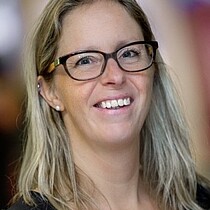

Video: Monday, 16 November 2015
More and more self-employed entrepreneurs are setting up their laptops at co-working spaces where they can work free of charge. These places have a more sociable vibe than your home, serve decent coffee and often offer lunch into the bargain. But do they actually add value to your business? They do if you ‘pay’ for your free lunch with ‘social capital’, according to a study carried out by Associate Professor Vareska Van de Vrande and Assistant Professor Michiel Tempelaar from Rotterdam School of Management, Erasmus University (RSM).
Entrepreneurs can benefit considerably from working at co-working spaces, Van de Vrande and Tempelaar found. Regular visitors to several venues run by Seats2Meet indicated in a survey that they had benefited from unexpected meetings with fellow co-working space users and that they often feel they are part of a community. In practical terms, this resulted in 34 per cent of 500 respondents saying they had been able to improve their own products and services thanks to other people’s input. In addition, many respondents indicated that other people working at the co-working spaces had helped them further develop business skills such as book-keeping or making a website (38 per cent), or tapping into new customer networks (30 per cent).
The researchers also found that the powerful sense of community and strong informal networks built at co-working spaces are a breeding ground for collaborative innovation. “These collaborations often develop from a chance encounter during which curious entrepreneurs strike up a conversation about each other’s qualities and projects,” said Van de Vrande.
So what about all these advantages and free lunches? How do they work? According to Van de Vrande, they are governed by the psychological mechanism of reciprocity. “If you feel you’ve been given something valuable, you will be subconsciously inclined to return the favour,” she said. “In this case, entrepreneurs will pay back people they have met at a co-working space by providing them with social capital: their knowledge, expertise and networks.” This is how the modern-style social contract works, said Van de Vrande: “As an entrepreneur, your best chance of benefiting from a co-working space is by showing a willingness to listen to others and share your own knowledge.”
Van de Vrande drew up a few tips, based on her research results, for people who wish to make the most of their co-working places:
Be sure to strike up a conversation with the other people working at your desk and any other people you may come across at the coffee-vending machine.
Try to get a good feel for other people’s qualities and how they may relate to your line of work. Chances are others will be assessing you, as well.
Take your time, visit your co-working place regularly, and don’t forget to attend activities hosted by the venue, such as ‘Social Friday’ events. Many advantages can be gained from a sense of community, and it takes time to establish such a community.
In some cases, there really is such a thing as a ‘free lunch’. If you’re an entrepreneur, don’t miss out on your chance of a free lunch!

Associate Professor Vareska Van de Vrande carried out her study Creating Communities of Innovation in co-operation with Assistant Professor Michiel Tempelaar. The management summary can be obtained upon request.


Science Communication and Media Officer
Rotterdam School of Management, Erasmus University (RSM) is one of Europe’s top-ranked business schools. RSM provides ground-breaking research and education furthering excellence in all aspects of management and is based in the international port city of Rotterdam – a vital nexus of business, logistics and trade. RSM’s primary focus is on developing business leaders with international careers who can become a force for positive change by carrying their innovative mindset into a sustainable future. Our first-class range of bachelor, master, MBA, PhD and executive programmes encourage them to become to become critical, creative, caring and collaborative thinkers and doers.
